Cシリーズ 焦電エネルギーセンサ
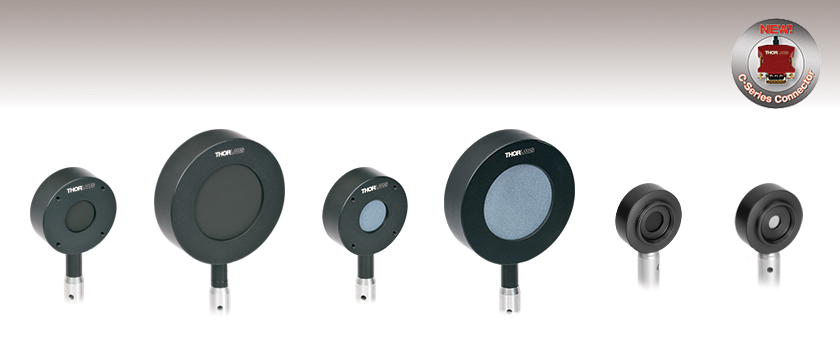
- Energy Ranges Covering 10 µJ to 15 J
- Repetition Rates of Up to 10 kHz
- Wavelength Ranges Covering 185 nm to 25 µm
- BNC to C-Series Adapter included
High Energy Sensors with Ceramic Coating (Shown with Included Isolator, Post Not Included)
ES220C
ES245C
Standard Sensors with Black Coating (Shown with Included Isolator, Post Not Included)
ES312C
Black Coating
ES120C
ES145C
ES408C
Metal Coating
Fast Sensors for High Repetition Rates
(Post Not Included)

Please Wait
| Type | Standard | High Energy | Fast | |
|---|---|---|---|---|
| Item # | ES1xxC | ES2xxC | ES3xxC | ES4xxC |
| Energy Range | 10 µJ - 2 J | 500 µJ - 15 J | 100 µJ - 1 J | 50 µJ - 1 J |
| Wavelength Range | 0.185 - 25 µm | 0.185 - 25 µm | 0.185 - 25 µm | 0.185 - 2.5 µm |
| Max Power Density (Pulse Width) | 8 MW/cm2 (10 ns Pulse) | 65 MW/cm2 (7 ns Pulse) | 8 MW/cm2 (10 ns Pulse) | 5 MW/cm2 (10 ns Pulse) |
| Repetition Rate | 30 Hz - 40 Hz | 30 Hz | 250 Hz - 1 kHz | 2 kHz - 10 kHz |
| Coating | Black | Ceramic | Black | Metal |
| Typical Application | Wavelength-Independent Energy Measurements | High Energy Densities | High Repetition Rates | |
| Power Meter Selection Guide |
|---|
| Sensors |
| Photodiode Power Sensors |
| Thermal Power Sensors |
| Thermal Position & Power Sensors |
| Pyroelectric Energy Sensors |
| Power Meter Consoles and Interfaces |
| Digital Handheld Console |
| Analog Handheld Console |
| Touchscreen Handheld Console |
| Dual-Channel Benchtop Console |
| USB Interfaces with External Readout |
| Complete Power Meters |
| Power Meter Bundles |
| Wireless Power Meters with Sensors |
| Compact USB Power Meters |
| Field Power Meters for Terminated Fibers |
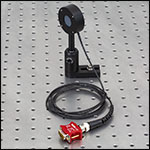 Click to Enlarge
Click to Enlargeこれらの焦電エネルギーセンサはBNCコネクタで終端されています。Cシリーズのパワーメーターコンソールまたはインターフェイスとの接続用にBNC-Cシリーズ変換アダプタが付属します。
特長
- 広い波長範囲とパワー範囲のパルス用途
- 全品校正済み、NISTおよびPTBにトレーサブルのCertificate of Calibration(校正証明書)付き
- オシロスコープに直接接続できるBNCコネクタ
- BNC-Cシリーズ変換アダプタには、校正および識別データが付属
- Cシリーズのエネルギーメーターコンソールおよびインターフェイスに対応(詳細は下表参照)
当社の焦電エネルギーメーターセンサは10 µJ ~15 Jのエネルギー範囲のパルス光源を検出します。ES4xxC以外の全てのセンサは185 nm~25 µmの波長範囲にわたって平坦な応答を示します。ES4xxCは185 nm~2.5 µmの波長範囲に対応します(詳細は「吸収グラフ」タブをご覧ください)。焦電センサは、光パルスのエネルギーを電圧パルスに変換する測定原理であるため、CW光源の測定には適しません。
汎用センサES1xxCは、エネルギー範囲10 µJ~2 J、繰返し周波数40 Hz以下の光源に適用できます。センサES2xxCは、最大65 MW/cm2(パルス幅7 ns)の高いパワー密度に対応できるように設計されています。繰返し周波数1 kHz以下の光源用には、185 nm~25 µmの広い波長範囲にわたりエネルギー範囲が100 µJ ~1 Jの光源を検出可能な高速エネルギーセンサES3xxCをご使用いただけます。10 kHz以下の高い繰返し周波数には、波長範囲2.5 µm以下、エネルギー範囲50 µJ~1 Jの光源を検出可能なセンサES4xxCがございます。
互換性
当社のすべての焦電エネルギーセンサは、ベンチトップ型コンソールPM5020と、パワー&エネルギーメーターインターフェイスPM103xと接続できます。また、ES408C以外のすべてのセンサは、パワー&エネルギーメーターコンソールPM400、PM100DならびにインターフェイスPM100USBに接続できます。コンソールおよびインターフェイスのオプションについては「コンソールセレクション」タブをご覧ください。
また、これらのセンサは、BNCコネクタを介して1 MΩ入力抵抗のオシロスコープに直接接続することができます。汎用センサES1xxCおよび高エネルギーセンサES2xxCの場合、オシロスコープでより高い繰返し周波数に対応するために負荷抵抗を低減することができます。250 Hz以上の繰返し周波数を検出可能な高速エネルギーセンサES3xxCおよびES4xxCでは、1 MΩの負荷で最適化されているため、これ以外の負荷抵抗で使用すると速度が低下する可能性があります。
センサーヘッドの底部には#8-32ネジ取付穴(センサES1xxC、ES2xxC)、またはM4も可能なコンビネジ取付穴(センサES3xxC、ES4xxC)があります。センサES1xxCおよびES2xxCのヘッドは、接地ループおよび電気ノイズに非常に敏感であるため、付属の電気絶縁ポスト用アダプタの1つにセンサーヘッドを取り付けることをお勧めします。各センサーヘッドには、ミリ規格とインチ規格のアダプタが1つずつ付属し、ミリ規格またはインチ規格のØ12.7 mm(Ø1/2インチ)ポストに直接取り付けられるようになっています。センサES3xxCおよびES4xxCは、電気絶縁用のアダプタが不要な設計になっています。ES120CおよびES220Cは、前面にある4つのネジ穴にケージロッドを取り付けることにより30 mmケージシステムに組み込むこともできますが、この取り付け方法では電気的絶縁は得られません。センサES3xxCおよびES4xxCには、SM1外ネジ付きの入射開口部があり、当社のSM1レンズチューブに対応します。
校正
センサーヘッドは全て校正対象となっており、NISTおよびPTBトレーサブル校正証明書と一緒に出荷されます。校正や認証に関するデータはBNC-Cシリーズ変換アダプタ(上の写真参照)内に保存されており、接続されたパワーメーターコンソールまたはインターフェイスに自動的にダウンロードされます。
再校正サービス
当社では再校正サービスを提供しております。センサ精度維持および測定値の検証のために、定期的な再校正をお勧めしています。校正頻度はご用途にもよりますが、通常1年程度です。再校正の詳細や価格などにつきましては、当社までお問い合わせください。
| Item # | ES111C | ES120C | ES145C | ES220C | ES245C |
|---|---|---|---|---|---|
| Technical Specs | |||||
| Detector Type | Standard Pyroelectric Energy Sensor | High-Energy Pyroelectric Energy Sensor | |||
| Wavelength Range | 185 nm - 25 µm | 185 nm - 25 µm | |||
| Optical Energy Range | 10 µJ - 150 mJ | 100 µJ - 500 mJ | 500 µJ - 2 J | 500 µJ - 3 J | 1 mJ - 15 J |
| Max Repetition Rate (@ 1 MΩ Load) | 40 Hz | 30 Hz | 30 Hz | 30 Hz | 30 Hz |
| Max Power Density (Pulse Width) | 8 MW/cm2 (10 ns Pulse) | 65 MW/cm2 (7 ns Pulse @ 355 nm) | |||
| Max Pulse Energy Density (Pulse Width) | 0.15 J/cm2 (1 µs Pulse) | 0.45 J/cm2 (7 ns Pulse @ 355 nm) | |||
| Max Average Power | 0.15 W | 0.15 W | 0.5 W | 5 W | 10 W |
| Resolution | 100 nJ | 1 µJ | 1 µJ | 25 µJ | 50 µJ |
| Linearity | ±1% | ±1% | |||
| Measurement Uncertainty | ±5% @ 190 nm - 25 µm | ±5% @ 185 nm - 25 µm | ±5% @ 185 nm - 25 µm | ±5% @ 185 nm - 25 µm | |
| Thermal Time Constant | 20 ms | 20 ms | |||
| Item # | ES308C | ES312C | ES408C | ES412C |
|---|---|---|---|---|
| Technical Specs | ||||
| Detector Type | Fast Pyroelectric Energy Sensor | |||
| Wavelength Range | 185 nm - 25 µm | 185 nm - 2.5 µm | ||
| Optical Energy Range | 500 µJ - 1 J | 100 µJ - 1 J | 100 µJ - 1 J | 50 µJ - 500 mJ |
| Max Repetition Rate (@ 1 MΩ Load) | 1 kHz | 250 Hz | 10 kHz | 2 kHz |
| Max Power Density (Pulse Width) | 8 MW/cm2 (10 ns Pulse) | 5 MW/cm2 (10 ns Pulse) | ||
| Max Pulse Energy Density (Pulse Width) | 80 mJ/cm2 (10 ns Pulse) | 50 mJ/cm2 (10 ns Pulse) | ||
| Max Average Power | 0.5 W | 0.5 W | ||
| Resolution | 5 µJ | 1 µJ | 1 µJ | |
| Linearity | ±1% | ±1% | ||
| Measurement Uncertainty | ±5% @ 185 nm - 25 µm | ±5% @ 185 nm - 2.5 µm | ||
| Thermal Time Constant | 0.6 ms | 2 ms | 0.07 ms | 0.5 ms |
センサに関連する用語の定義についてはこちらをご覧ください。
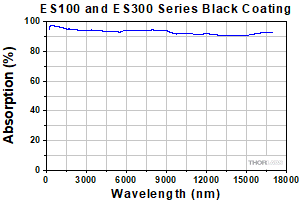
Click to Enlarge
生データはこちらからダウンロードいただけます。
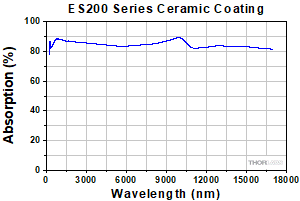
Click to Enlarge
生データはこちらからダウンロードいただけます。
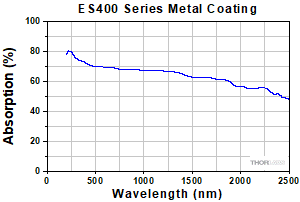
Click to Enlarge
生データはこちらからダウンロードいただけます。
Cシリーズコネクタ用アダプタ
Dタイプオス型
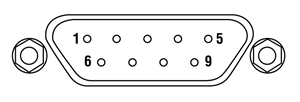
| Pin | Connection |
|---|---|
| 1 | Not Used |
| 2 | EEPROM Data |
| 3 | Pyroelectric Sensor Ground |
| 4 | Not Used |
| 5 | Pyroelectric Sensor + |
| 6 | EEPROM Ground |
| 7 | Present: Sensor Recognition |
| 8 | Not Used |
| 9 | Not Used |
センサーコネクタ
BNCオス型
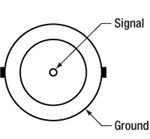
当社では、幅広いパワーメータ&エネルギーメータ用コンソールやパワーセンサ・エネルギーセンサを操作するためのインターフェイスを取り揃えています。 主な仕様は下記でご覧いただけるので、お客様の用途に適したモデルをお選びいただけます。 下記のほかに、センサ内蔵のワイヤレスパワーメータや小型USBパワーメータもご用意しております。
当社のパワーメータ等用のコンソールやインターフェイスは、Cシリーズのセンサとお使いいただく場合は接続したセンサの種類を自動的に認識し、電流値とそれに応じた電圧値を測定します。 Cシリーズのセンサは、コネクタ内に感度特性の校正データが保存されています。 コンソールは、入射波長に対応する感度の値を読み出し、パワーもしくはエネルギの測定値を計算します。
- フォトダイオードセンサは、入射光の光パワーと波長によって決まる電流を流します。 この電流は、トランスインピーダンスアンプに送られ、このアンプから入力電流に比例した電圧が出力されます。 フォトダイオードの感度は波長に依存するため、正確なパワーの測定値を得るためには、コンソールに正しい波長を入力する必要があります。 コンソールは、接続されたセンサから、入力された波長における感度を読み取り、測定した光電流から光パワーを計算します。
- サーマルセンサは、入射された光パワーに比例した電圧を送ります。 測定されたセンサの出力電圧とその感度特性に基づいて、コンソールは入射した光パワーを計算します。
- エネルギーセンサは焦電効果に基づいています。 したがって、エネルギーセンサは、パルスエネルギに比例したピーク電圧を送ります。 エネルギーセンサが認識されると、コンソールはピーク電圧ディテクタを活用し、センサの感度特性からパルスエネルギが計算されます。
コンソールやインターフェイスはセンサが出力する電流や電圧を表示する機能も備えています。 または、測定された電流や電圧をアナログ出力で得ることもできます。
コンソール
| Item # | PM100A | PM100D | PM400 | PM5020 |
|---|---|---|---|---|
| (Click Photo to Enlarge) | 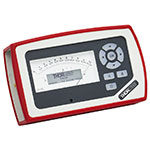 | 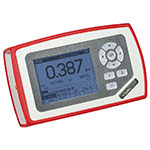 | 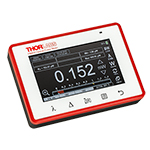 | 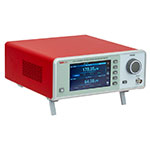 |
| Key Features | Analog Power Measurements | Digital Power and Energy Measurements | Digital Power and Energy Measurements, Touchscreen Control | Dual Channel |
| Compatible Sensors | Photodiode and Thermal Power | Photodiode Power, Thermal Power, and Pyroelectric Energya | Photodiode Power, Thermal Power, Thermal Power and Position, and Pyroelectric Energya | Photodiode Power, Thermal Power, Thermal Power and Position, and Pyroelectric Energy |
| Housing Dimensions (H x W x D) | 7.24" x 4.29" x 1.61" (184 mm x 109 mm x 41 mm) | 7.09" x 4.13" x 1.50" (180 mm x 105 mm x 38 mm) | 5.35" x 3.78" x 1.16" (136.0 mm x 96.0 mm x 29.5 mm) | 9.97" x 4.35" x 11.56" (253.2 mm x 110.6 mm x 293.6 mm) |
| Channels | 1 | 2 | ||
| External Temperature Sensor Input (Sensor not Included) | - | - | Readout and Record Temperature Over Time | Readout and Record Temperature Over Time |
| External Humidity Sensor Input (Sensor not Included) | - | - | Readout and Record Humidity Over Time | Readout and Record Humidity Over Time |
| Input/Output Ports | - | 4 GPIO, Programmable | 4 Configurable Digital I/O Channels | |
| Shutter Control | - | - | - | Support for SH05R(/M) or SH1(/M) Optical Shutter with Interlock Input |
| Fan Control | - | - | - | |
| Source Spectral Correction | - | - | ||
| Attenuation Correction | - | - | ||
| External Trigger Input | - | - | - | |
| Display | ||||
| Type | Mechanical Needle and LCD Display with Digital Readout | 320 x 240 Pixel Backlit Graphical LCD Display | Protected Capacitive Touchscreen with Color Display | |
| Dimensions | Digital: 1.9" x 0.5" (48.2 mm x 13.2 mm) Analog: 3.54" x 1.65" (90.0 mm x 42.0 mm) | 3.17" x 2.36" (81.4 mm x 61.0 mm) | 3.7" x 2.1" (95 mm x 54 mm) | 4.32" x 2.43" (109.7 mm x 61.6 mm) |
| Refresh Rate | 20 Hz | 10 Hz (Numerical) 25 Hz (Analog Simulation) | 25 Hz | |
| Measurement Viewsb | ||||
| Numerical | ||||
| Mechanical Analog Needle | - | - | - | |
| Simulated Analog Needle | - | |||
| Bar Graph | - | |||
| Trend Graph | - | |||
| Histogram | - | - | - | |
| Statistics | ||||
| Memory | ||||
| Type | - | SD Card | NAND Flash | SD Card |
| Size | - | 2 GB | 4 GB | 8 GB |
| Power | ||||
| Battery | LiPo 3.7 V 1300 mAh | LiPo 3.7 V 2600 mAh | - | |
| External | 5 VDC via USB or Included AC Adapter | 5 VDC via USB | Line Voltage: 100 - 240 V | |
パルスレーザ:パワーとエネルギーの計算
パルスレーザからの放射光が、使用するデバイスや用途に適合するかどうかを判断する上で、レーザの製造元から提供されていないパラメータを参照しなければならない場合があります。このような場合、一般には入手可能な情報から必要なパラメータを算出することが可能です。次のような場合を含めて、必要な結果を得るには、ピークパルスパワー、平均パワー、パルスエネルギ、その他の関連するパラメータを必要とすることがあります。
- 生物試料を損傷させないように保護する
- フォトディテクタなどのセンサにダメージを与えることなくパルスレーザ光を測定する
- 物質内で蛍光や非線形効果を得るために励起を行う
パルスレーザ光のパラメータは下の図1および表に示します。参照用として、計算式の一覧を以下に示します。資料を ダウンロードしていただくと、これらの計算式のほかに、パルスレーザ光の概要、異なるパラメータ間の関係性、および計算式の適用例がご覧いただけます。
計算式 | ||||
 | 、 |  | ||
 | ||||
 | ||||
 | ||||
平均パワーから算出するピークパワー、ピークパワーから算出する平均パワー : | ||||
 | 、 |  | ||
| 平均パワーおよびデューティーサイクルから算出するピークパワー*: | ||||
 | *デューティーサイクル( ) はレーザのパルス光が放射されている時間の割合です。 ) はレーザのパルス光が放射されている時間の割合です。 | |||
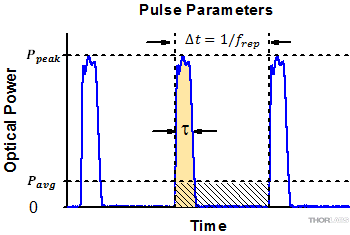
Click to Enlarge
図1: パルスレーザ光の特性を記述するためのパラメータを、上のグラフと下の表に示します。パルスエネルギ (E)は、パルス曲線の下側の黄色の領域の面積に対応します。このパルスエネルギは斜線で表された領域の面積とも一致します。
| パラメータ | シンボル | 単位 | 説明 | ||
|---|---|---|---|---|---|
| パルスエネルギ | E | ジュール[J] | レーザの1周期中に放射される1パルスの全放射エネルギ。 パルスエネルギはグラフの黄色の領域の面積に等しく、 これは斜線部分の面積とも一致します。 | ||
| 周期 | Δt | 秒 [s] | 1つのパルスの開始から次のパルスの開始までの時間 | ||
| 平均パワー | Pavg | ワット[W] | パルスとして放射されたエネルギが、1周期にわたって 均一に広がっていたと仮定したときの、 光パワーの大きさ(光パワー軸上の高さ) | ||
| 瞬時パワー | P | ワット[W] | 特定の時点における光パワー | ||
| ピークパワー | Ppeak | ワット [W] | レーザから出力される最大の瞬時パワー | ||
| パルス幅 |  | 秒 [s] | パルスの開始から終了までの時間。一般的にはパルス形状の 半値全幅(FWHM)を基準にしています。 パルス持続時間とも呼ばれます。 | ||
| 繰り返し周波数 | frep | ヘルツ [Hz] | パルス光が放射される頻度を周波数で表示した量。 周期とは逆数の関係です。 | ||
計算例
下記のパルスレーザ光を測定するのに、最大入力ピークパワーが75 mW
のディテクタを使用するのは安全かどうかを計算してみます。
- 平均パワー: 1 mW
- 繰り返し周波数: 85 MHz
- パルス幅: 10 fs
1パルスあたりのエネルギは、

と低いようですが、ピークパワーは、

となります。このピークパワーはディテクタの
最大入力ピークパワーよりも5桁ほど大きく、
従って、上記のパルスレーザ光を測定するのに
このディテクタを使用するのは安全ではありません。
| Posted Comments: | |
user
(posted 2023-09-12 10:18:08.027) Hello, I am using an ES220C with a PM100USB. Sometimes, after connecting to the device (with no issues), we get the error "Timeout expired before operation completed" the first time measEnergy is called. This happens randomly (sometimes we are able to make measurements with no issues, and sometimes we are not). Also, occasionally we can make several measurements and then run into this error again. Can you let us know how we can avoid this issue? hkarpenko
(posted 2023-09-13 07:39:05.0) Dear customer,
thank you for your feedback.
The issue in this case might be, that the trigger level is set incorrectly. I will contact you directly to discuss this further with you. Kais Ben Khadhra
(posted 2023-07-31 14:02:16.683) Dear Madame/Sir,
I have a question about the maximum PRF which could ES408C receive. If I am not wrong the maximum PRF is 10 kHz? but in the power and energy calculation of the pulsed laser a PRF of 85 MHz has been used?
for my application I am searching of power sensor for high PRF (up to 400 MHz) pulsed laser and even for CW laser.
Best regards,
Dr.-Ing. MBA Kais Ben Khadhra
Artec 3D Luxembourg dpossin
(posted 2023-08-01 01:49:27.0) Dear Khadhra,
Thank you for your feedback. I am reaching out to you to provide further information. user
(posted 2023-04-19 11:25:35.407) Hi, the damage thresholds listed for the pyroelectrics sensors (such as the ES245C) are for uniform cross sections (top hat) or for Gaussian profiles? Also, how can i scale the damage thresholds for other pulses lengths? (the ones listed are for 7ns pulses) hchow
(posted 2023-04-20 05:10:26.0) Dear User, thank you for your feedback. The damage thresholds listed on the spec sheet of the ES245C are that for Gaussian beam profiles. The maximum power density: 65 MW/cm² (7 ns Pulse @ 355 nm) and maximum pulse energy density: 0.45 J/cm² (7 ns Pulse @ 355 nm) of the ES145C is given for pulse widths at 7 ns. If you take a look at the spec sheet PDF of the ES245C, on the middle graph of page 2, this graph illustrates the damage threshold with respect to the given pulse width length. You can refer to graph when you want to scale the pulse widths to higher values. Cagdas Yuksel
(posted 2023-01-03 17:40:30.67) Hi Dear,
We try to use ES220 with PM100D. However, refresh rate of the screen varies randomly. Also when we try to zero it the screen get frozen.
Do you have any user manuel for this product ?
Thank You. fmortaheb
(posted 2023-01-04 08:13:14.0) Thank you very much for contacting us. I will contact you directly for troubleshooting. Su Jing
(posted 2022-11-30 02:29:31.347) 使用ES111C探头连接PM100D表头,表头显示探头已连接,但是开启光源后表头显示--,并无实际测量值。 user
(posted 2022-09-14 12:38:44.717) I use an ES111C sensor to detect 5ns pulses with a repetition rate of 10Hz. The integration time on the PM100USB software is 1 second, during which I measure on average 10 pulses. The measurement values are in mJ.
Are the displayed/measured values in the optical power monitor software the sum of 10 pulses or is it the average energy of 1 pulse?
Best, Jur wskopalik
(posted 2022-09-19 04:15:58.0) Thank you very much for your feedback!
With pyroelectric sensors such as the ES111C you can measure the energy contained in a single pulse. If you set the “Averaging” in the software to a number larger than 1, the software will calculate the average energy of the selected number of single pulses and will show this value.
I will contact you directly to provide further assistance. Julien Gorenflot
(posted 2022-08-19 00:32:11.323) Dear team,
I would like to know if the C-series energy sensors can accurately measure the energy of femtoseconsd and picosecond pulses, as the specs only mention about 10s of nanosecond. Additionally, is there some additional precautions to take for such short pulses.
Best regards,
Julien dpossin
(posted 2022-08-19 08:25:35.0) Dear Julien,
Thank you for your feedback. The damage threshold depends on the average power, the peak power density and the pulse energy. I reach out to you in order to discuss this in more detail. Dennis Clouthier
(posted 2022-04-05 12:02:45.887) I have a RS11C pyroelectric energy sensor. The black coating is slightly damaged. Is it possible for me to repair this and if so can you tell me how to do so? Thanks! wskopalik
(posted 2022-04-08 11:05:37.0) Dear Dennis,
Thank you very much for your feedback!
You can unfortunately not repair this yourself because the sensor element needs to be exchanged in this case and the sensor needs to be calibrated again with the new element. We can however repair and calibrate it in our facilities.
I will contact you directly to arrange the repair. John Linden
(posted 2021-08-15 22:37:02.877) I am looking for an energy meter to measure the profile and energy of a pulse from CO2 high power laser , 10.6um wavelength.
Can this product ES245C measure this? or it this the same as measuring total power as a S322C and then I would need a PDAVJ10 for profile sensing. Would I be able to then connect the power/energy meters to the PM400?
Appreciate you advice.
-John soswald
(posted 2021-08-18 07:50:06.0) Dear John,
thank you for your feedback.
If the pulse energy of your laser does not exceed the 1 mJ - 15 J range the ES245C can measure the pulse energy instead of the average power which the S332C measures.
Please keep the maximum repetition rate of 30 Hz and the maximum power density of 65 MW/cm² and maximum pulse energy of 0.45 J/cm² in mind.
The ES245C is compatible with our PM400 power meter console.
I have contacted you directly to discuss your application in more detail. 启元 吴
(posted 2020-11-16 13:59:35.863) 工程师您好,我们于今年九月份购买了贵公司的ES245C型号的热释电能量探头,用于对脉冲激光能量的测试。但是收到的探头序号和我们之前的不一样,一个是C552,一个是C730。使用这两个不同的探头测得的数据也是不一样的。我们安装旧的探头的时候,量程选择为100mj、1J等。但是用新的探头的时候,量程选择是140mj、1.4j等,使用新的探头测量得到的数据是老的探头的1.4倍。所以想请教一下这个问题到底是为什么、该怎么进行校准? wskopalik
(posted 2020-11-16 06:26:50.0) Thank you very much for your inquiry!
The energy ranges which are shown on the power meter display will be slightly different for each sensor. It depends on the exact responsivity of the attached sensor which is determined in the calibration procedure. The shown range will e.g. also change, if the wavelength is changed. The measured values should however be the same on all attached sensors.
We will contact you directly to provide further assistance. Vladimir Makarov
(posted 2020-08-26 14:21:40.587) Hi,
I am using the ES220C to measure laser energy. I am using a pulsed laser at 1000 Hz frequency. On the oscilloscope the signal from ES220C looks like a sawtooth wave where the signal never reaches 0V, but goes up/down with the firing of each pulse in the pulse-train.
I understand this setup exceeds the repetition rate spec of 30Hz of this sensor. Can you explain if the total energy detected would be inaccurate? It seems the laser keeps adding heat/energy to the meter at a high frequency, so the meter should still integrate this energy, correct?
Best,
Vlad M dpossin
(posted 2020-08-28 05:04:35.0) Dear Vladimir,
Thank you for your feedback. Well, the fact that pyroelectric sensors can only see signal changes, the measurement of higher repetition rates leads to wrong energy measurements. The energy is measured via the the time it takes between an incoming pulse exceeding the set trigger level and reaching the peak. In case the repetition rate of the laser source exceeds the sampling rate of the detector, the detector stays armed all the time which most leads to wrong measurements. I am reaching out to you in order to provide further support. song wei
(posted 2019-03-22 15:15:05.84) ES220C能量计接到PM100D表头上怎么使用?为什么用了几次没有读数? How to use the ES220C with PM100D? Why there is no respondance during my measurements? swick
(posted 2019-03-28 06:28:23.0) This is a response from Sebastian at Thorlabs. Thank you for the inquiry.
Usage of ES220C with PM100D is Plug&Play. If you get no energy reading please check settings energy range and trigger level.
I contacted you directly for troubleshooting. Jack Grigor
(posted 2019-03-15 11:29:57.383) can you tell me the relevance of the absorption graph shown for the ceramic coated ES245C detector? The specification quotes a measurement uncertainty of+/- 5% from 185 nm to 25 um, how does the absorption of the ceramic coating affect that when it drops by about 20% shortly after 1000nm? Does the detector responsivity not change at those longer wavelengths?
Thanks in advance. nreusch
(posted 2019-03-19 06:02:23.0) This is a response from Nicola at Thorlabs. Thank you for your inquiry! Generally speaking, a low responsivity of a detector system for certain wavelength ranges can lead to a reduced accuracy in this range. This is, however, only relevant if the responsivity is reduced by a lager factor. For e.g. our photodiode sensors, we specify different uncertainties for different wavelength ranges (3%, 5% or 7%). The 5% measurement uncertainty for ES245C is valid across the whole wavelength range. Bruce Melcher
(posted 2019-03-13 10:24:47.53) Is the ES220C sensor fast enough to respond to a single 7ns pulse at a 6mJ power level?
We are firing a single shot, 7ns, 6mJ, 1570nm Laser pulse into the ES220C sensor. We "appear" to get nothing but noise as an output (less than 1 mV). nreusch
(posted 2019-03-19 08:24:22.0) This is a response from Nicola at Thorlabs. Thank you for your inquiry. Pyroelectric sensors can resolve single pulses as long as the pulse energy is within the specified range. Please double check that the trigger level and the energy range are set correctly. We will contact you directly to provide further assistance. j.t.m.dehaas
(posted 2016-08-04 08:53:32.52) What is the input resistance of the BNC to DB9 mating adapter?
In other words what is the max. repetition rates of the sensor + the adapter?
Best regards
Johan swick
(posted 2016-08-04 06:00:28.0) This is a response from Sebastian at Thorlabs. Thank you very much for your inquiry.
The input resistance of the BNC-DB9 adapter is quite low and has no measurable effect on the repetition rate. The load resistance of our power meter consoles is 1MOhm, so with our power meter consoles (PM200, PM100D, PM100USB and PM320) and ES111C the maximum achievable repetition rate is 40Hz.
If the signal from ES111C is recorded with an other device than our power meter consoles, the maximum repetition rate (with 50kOhm) would be 100Hz. yuansuochao
(posted 2014-04-29 15:25:49.493) ES120C和145C能量计接到PM200表头上怎么使用?为什么用了几次没有读数?
How to use the ES120C with PM200? Why there is no respondance during my measurements? shallwig
(posted 2014-04-30 07:06:48.0) This is a response from Stefan at Thorlabs. Thank you very much for your inquiry. I am really sorry that you are experiencing difficulty with our ES120C sensor in combination with the PM200 power meter. These two units work together, perhaps the settings of the trigger level are not correct. If it is set too high the pulses will not be recognized by the device. On page 31 in the manual http://www.thorlabs.com/thorcat/19300/PM200-Manual.pdf we describe how to change this setting. In order to troubleshoot where your measurement problems come from and how to solve them I will contact you directly. sergii.yakunin
(posted 2013-10-16 09:19:32.03) Will ES111C head work with optically chopped CW light? tschalk
(posted 2013-10-16 11:18:00.0) This is a response from Thomas at Thorlabs. Thank you very much for your inquiry. An energy Sensor is not designed to work with a chopped light source. Therefore photo diodes or thermal sensors would be a better solution. I will contact you directly to discuss your application. julien
(posted 2011-01-28 04:50:28.0) A response from Julien at Thorlabs: Thank you for your feedback. The specification of the pulse length for the 150mJ/cm2 value is wrong and will be changed immediately. This max energy density corresponds to the maximum energy for long pulses (>1µs). Above this value the heat increase will bring the sensor above its Curie temperature and thus hamper its proper functioning. The curve in the spec sheet corresponds to the damage threshold of the adsorber surface. When damaged, the absorption of this surface will change and the responsivity of the sensor will be modified accordingly. matthew.bergkoetter
(posted 2011-01-26 16:26:55.0) The max pulse energy density for the ES111C is specified here on the webpage as 0.15J/cm2 for a 10ns pulse at 1064nm, however the PDF spec sheet seems to contradict this. Based on the plot titled "Pulse Energy Ratings and Damage Thresholds", the max energy density for a 10ns pulse would be more like 2mJ/cm2 - a discrepancy of two orders of magnitude. Which is correct? user
(posted 2010-09-21 05:45:39.0) Answer from Angelika at Thorlabs: The specification "max repetition rate" refers to the maximum data acquisition rate of the sensor. It is defined by the time constant of the sensor (time required to reach the initial sensor properties after a pulse). user
(posted 2010-09-10 06:44:52.0) Does the maximum repetition rate for the ES111C of 40Hz refer to the maximum data acquisition rate of the sensor or the maximum repetition rate of the laser to avoid damage to the sensor? julien
(posted 2010-08-11 12:30:55.0) A response from Julien at Thorlabs: the wavelength dependence of the damage threshold is related to absorption of the surface coating. As can be seen in the tab absorption graph, the absorption of the ES100 series is almost wavelength independent. The damage threshold specified can be thus used over the whole wavelength range of those sensors. user
(posted 2010-08-10 23:32:52.0) the Max Pulse Energy Density of ES111C is specified with 7ns pulse but at what wavelength? |
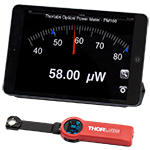
Click to Enlarge
ワイヤレスパワーメータPM160とiPad mini(付属していません)。PM160はApple社のモバイルデバイスを使ってリモート操作が可能です。
こちらでは当社のパワーセンサおよびエネルギーセンサのラインナップをご紹介しています。対応するパワーメーターコンソールとインターフェイスについては右下の表をご覧ください。
下記のパワーセンサおよびエネルギーセンサのラインナップのほかに、当社ではフォトダイオードまたはサーマルセンサのどちらかを内蔵するオールインワン型のワイヤレス機能付きパワーメータや小型USBパワーメータ、およびコンソール、センサーヘッド、ポスト取付け用のアクセサリを含むパワーメーターキットもご用意しております。
当社では4種類のセンサをご用意しております:
- フォトダイオードセンサ: フォトダイオードセンサは感度が波長に依存するので、単色光源もしくは単色に近い光源のパワー測定用に設計されています。このセンサから出力される電流は、入射光パワーと波長によって決まります。この電流はトランスインピーダンスアンプにより、入力電流に比例した電圧を出力します。
- サーマルセンサ: サーモパイルセンサは、広い波長範囲で比較的平坦な応答特性を持つ材料から作られているので、LEDやSLDなどの広帯域光源のパワー測定に適しています。このセンサは、入射光パワーに比例した電圧を出力します。
- サーマル位置&パワーセンサ: これらのセンサでは4つのサーモパイルセンサが正方形の4象限に配置されています。ユニットは各象限からの出力電圧を比較してビームの位置を算出します。
- 焦電エネルギーセンサ: 焦電センサは焦電効果を通じて出力電圧を発生しパルス光源の測定に適しています(ディテクタの時定数によって繰返し周波数は制限されます)。このセンサは、入力パルスエネルギに比例したピーク電圧を出力します。
| Console Compatibility | ||||||||
|---|---|---|---|---|---|---|---|---|
| Console Item # | PM100A | PM100D | PM400 | PM5020 | PM101 Series | PM102 Series | PM103 Series | PM100USB |
| Photodiode Power |  |  |  |  |  | - |  |  |
| Thermal Power |  |  |  |  |  |  | - |  |
| Thermal Position | - | - |  |  | - |  | - | - |
| Pyroelectric Energy | - |  a a |  a a |  | - | - |  |  a a |
パワー&エネルギーセンサのセレクションガイド
当社のパワー&エネルギーセンサの仕様を比較する際には、2種類の選択をします。下の表(展開できます)では、当社のセンサを種類別に分類して(フォトダイオード、サーマル、焦電)、主な仕様を記載しています。
またその下のセレクションガイドのグラフでは、当社のフォトダイオードならびにサーマルパワーセンサの全ラインナップを波長範囲(左)そしてパワー範囲(右)で比較できるようになっています。枠内には型番とセンサの仕様の範囲が記載されています。グラフにより、特定の波長範囲またはパワー範囲に適したセンサーヘッドが特定しやすくなっております。
| Photodiode Power Sensors |
|---|
| Thermal Power Sensors |
|---|
| Thermal Position & Power Sensors |
|---|
| Pyroelectric Energy Sensors |
|---|
センサのラインナップ
(波長範囲)
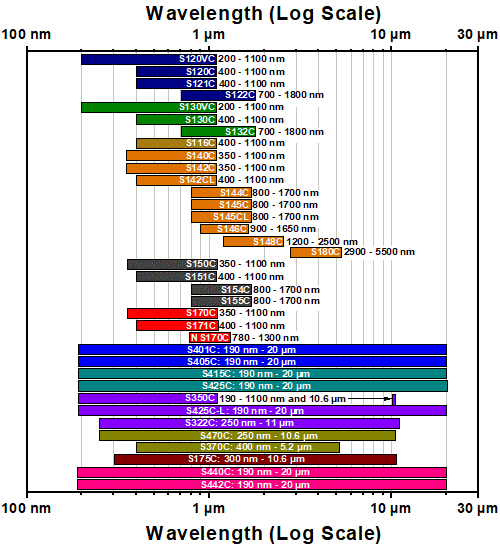
センサのラインナップ
(パワー範囲)
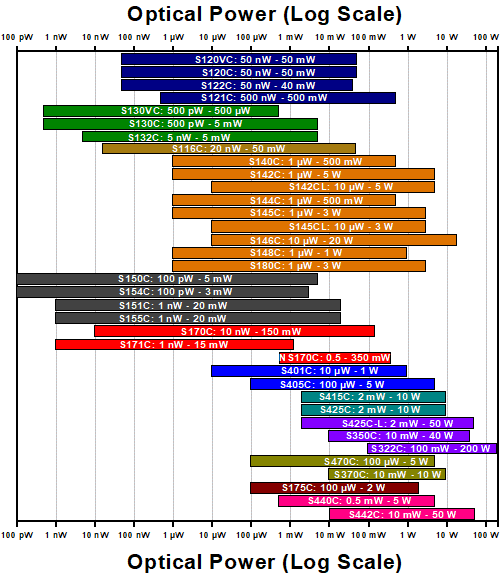
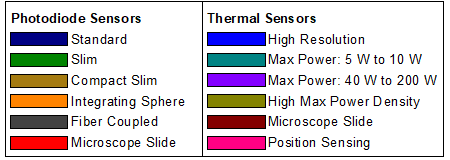

- 一般的な光パルス測定用
- 広い波長範囲で平坦な波長応答性を実現する黒色の広帯域コーテイング
- 検出部:Ø11 mm、Ø20 mm、Ø45 mm
- オシロスコープ用のBNCコネクタ
- 各センサの付属品
- 当社のコンソールと使用可能なCシリーズのコネクターアダプタ(下表または「コンソールセレクション」タブ参照)
- 電気的に絶縁されたポスト用アダプタ(ミリ規格品とインチ規格品それぞれ1つずつ)
標準焦電センサES1xxCは、コヒーレント光源およびインコヒーレント光源からのパルス測定用に設計されています。焦電センサは、光パルスのエネルギーを電圧パルスに変換する測定原理であるため、CW光源の測定には適しません。黒色広帯域コーティングの平坦な吸収プロファイルにより(下表参照)、低パワーで波長に無依存なエネルギー測定に適します。検出部がØ11 mm、Ø20 mm、Ø45 mmと大きいため、アライメントが容易です。また、これらのセンサは、BNCコネクタを介して1 MΩ入力抵抗のオシロスコープに直接接続することができます。高い繰返しレートのパルスをオシロスコープで測定する場合、負荷抵抗を下げることで対応が可能です。各エネルギーセンサには、NISTおよびPTBにトレーサブルの校正データが付いたBNC-Cシリーズ変換アダプタも含まれます。
当社では、エネルギーセンサの再校正サービスをご提供しています。詳細については当社までお問い合わせください。
| Item #a | ES111C | ES120C | ES145C |
|---|---|---|---|
| Sensor Image (Click the Image to Enlarge) |  |  |  |
| Input Aperture Size | Ø11 mm | Ø20 mm | Ø45 mm |
| Wavelength Range | 0.185 - 25 µm | ||
| Energy Range | 10 µJ - 150 mJ | 100 µJ - 500 mJ | 500 µJ - 2 J |
| Max Repetition Rateb | 40 Hz | 30 Hz | 30 Hz |
| Max Power Density (Pulse Width) | 8 MW/cm2 (10 ns Pulse) | ||
| Max Pulse Energy Density (Pulse Width) | 0.15 J/cm2 (1 µs Pulse) | ||
| Coating (Click for Plot) | Black Broadband | ||
| Resolution | 100 nJ | 1 µJ | 1 µJ |
| Linearity | ±1% | ||
| Measurement Uncertainty | ±5% @ 190 nm - 25 µm | ±5% @ 185 nm - 25 µm | ±5% @ 185 nm - 25 µm |
| Housing Dimensions | Ø36 mm x 16 mm | Ø50 mm x 18 mm | Ø75 mm x 21 mm |
| Active Detector Area | 95.0 mm2 | 314.2 mm2 | 1590.4 mm2 |
| Cable Length | 1.5 m (60") | ||
| Post Mounting | 8-32 Mounting Thread, 8-32 and M4 Insulating Adapters Included | ||
| Cage Mounting | N/A | Four 4-40 Threaded Holes for 30 mm Cage Systems | N/A |
| Compatible Consoles | PM400, PM100D, and PM5020 | ||
| Compatible Interfaces | PM103, PM103A, PM103E, PM103U, and PM100USB | ||

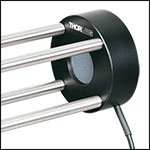
Click to Enlarge
30 mmケージシステムに取り付けたセンサES220C
- 最大15 Jまでの高エネルギー光パルスの測定が可能
- 高エネルギー密度レーザ(最大0.45 J/cm2)用に高い損傷閾値のセラミックコーティング
- 検出部: Ø20 mmまたはØ45 mm
- オシロスコープ用のBNCコネクタ
- 各センサの付属品
- 当社のコンソールと使用可能なCシリーズのコネクターアダプタ(下表または「コンソールセレクション」タブ参照)
- 電気的に絶縁されたポスト用アダプタ(ミリ規格品とインチ規格品それぞれ1つずつ)
高エネルギー焦電センサES2xxCは、コヒーレント光源およびインコヒーレント光源からのパルス測定用に設計されています。焦電センサは、光パルスのエネルギーを電圧パルスに変換する測定原理であるため、CW光源の測定には適しません。セラミックコーティングが使用されているため、センサES220Cでは3 Jまで、ES245Cでは15 Jまでの高エネルギー測定が可能です。検出部がØ20 mmまたはØ45 mmと大きいため、アライメントが容易です。また、これらのセンサは、BNCコネクタを介して1 MΩ入力抵抗のオシロスコープに直接接続することができます。高い繰返しレートのパルスをオシロスコープで測定する場合、負荷抵抗を下げることで対応が可能です。各エネルギーセンサには、NISTおよびPTBにトレーサブルの校正データが付いたBNC-Cシリーズ変換アダプタも含まれます。
当社では、エネルギーセンサの再校正サービスをご提供しています。詳細については当社までお問い合わせください。
| Item #a | ES220C | ES245C |
|---|---|---|
| Sensor Image (Click the Image to Enlarge) |  |  |
| Input Aperture Size | Ø20 mm | Ø45 mm |
| Wavelength Range | 0.185 - 25 µm | |
| Energy Range | 500 µJ - 3 J | 1 mJ - 15 J |
| Max Repetition Rateb | 30 Hz | 30 Hz |
| Max Power Density (Pulse Width) | 65 MW/cm2 (7 ns Pulse @ 355 nm) | |
| Max Pulse Energy Density (Pulse Width) | 0.45 J/cm2 (7 ns Pulse @ 355 nm) | |
| Coating (Click for Plot) | Ceramic | |
| Resolution | 25 µJ | 50 µJ |
| Linearity | ±1% | |
| Measurement Uncertainty | ±5% @ 0.185 - 25 µm | |
| Housing Dimensions | Ø50 mm x 18 mm | Ø75 mm x 21 mm |
| Active Detector Area | 314.2 mm2 | 1590.4 mm2 |
| Cable Length | 1.5 m (60") | |
| Post Mounting | 8-32 Mounting Thread, 8-32 and M4 Insulating Adapters Included | |
| Cage Mounting | Four 4-40 Threaded Holes for 30 mm Cage Systems | N/A |
| Compatible Consoles | PM400, PM100D, and PM5020 | |
| Compatible Interfaces | PM103, PM103A, PM103E, PM103U, and PM100USB | |

- 最大10 kHzまでの繰返し周波数の測定が可能
- 2種類のコーティング:
- 平坦な応答性を有する黒色広帯域コーティング(185 nm~25 µm)
- 最大10 kHzまでの繰返し周波数を検出可能な金属コーティング(185 nm~2.5 µm)
- 検出部:Ø8 mmまたはØ12 mm
- オシロスコープ用のBNCコネクタ
- 当社のコンソールと使用可能なCシリーズのコネクターアダプタ(下表または「コンソールセレクション」タブ参照)が付属
こちらの高速焦電センサは、繰返し周波数が最大10 kHzまでのコヒーレント光源およびインコヒーレント光源からのパルス測定用に設計されています。焦電センサは、光パルスのエネルギーを電圧パルスに変換する測定原理であるため、CW光源の測定には適しません。センサES3xxC は、黒色広帯域コーティングが施されており、185 nm~25 µmの広帯域で平坦な応答性を有します。また、センサのサイズによりますが、最大1 kHzまでの繰返し周波数の測定が可能です。金属コーティング付きのセンサE4xxCは、185 nm~2.5 µmのより狭い波長範囲にわたり、最大10 kHzまでの繰返し周波数を検出できます(センサのサイズによります)。検出部はØ8 mmまたはØ12 mmで、各入射開口部には当社のSM1ネジ付きレンズチューブに対応するSM1外ネジが付いています。これらのエネルギーセンサにはBNCコネクタが付いており、入力負荷抵抗1 MΩのオシロスコープに接続可能です。ただし、これ以外の負荷抵抗で使用すると速度が低下する可能性があります。各センサには、NISTおよびPTBにトレーサブルの校正データが付いたBNC-Cシリーズ変換アダプタも含まれます。
当社では、エネルギーセンサの再校正サービスをご提供しています。詳細については当社までお問い合わせください。
| Item #a | ES308C | ES312C | ES408C | ES412C |
|---|---|---|---|---|
| Sensor Image (Click the Image to Enlarge) |  |  |  |  |
| Input Aperture Size | Ø8 mm | Ø12 mm | Ø8 mm | Ø12 mm |
| Wavelength Range | 0.185 - 25 µm | 0.185 - 2.5 µm | ||
| Energy Range | 500 µJ - 1 J | 100 µJ - 1 J | 100 µJ - 1 J | 50 µJ - 500 mJ |
| Max Repetition Rateb | 1 kHz | 250 Hz | 10 kHz | 2 kHz |
| Max Power Density (Pulse Width) | 8 MW/cm2 (10 ns Pulse) | 5 MW/cm2 (10 ns Pulse) | ||
| Max Pulse Energy Density (Pulse Width) | 80 mJ/cm2 (10 ns Pulse) | 50 mJ/cm2 (10 ns Pulse) | ||
| Coating (Click for Plot) | Black Broadband | Metal | ||
| Resolution | 5 µJ | 1 µJ | 1 µJ | 1 µJ |
| Linearity | ±1% | |||
| Measurement Uncertainty | ±5% @ 0.185 - 25 µm | ±5% @ 0.185 - 2.5 µm | ||
| Housing Dimensionsc | Ø38 mm x 15 mm | Ø38 mm x 15 mm | Ø38 mm x 15 mm | Ø38 mm x 15 mm |
| Active Detector Area | 50.3 mm2 | 113.1 mm2 | 50.3 mm2 | 113.1 mm2 |
| Cable Length | 1.5 m (60") | |||
| Post Mounting | 8-32 and M4 Combi Mounting Thread | |||
| Aperture Thread | External SM1 (1.035"-40) Thread Thread Depth: 3.0 mm (0.12") | |||
| Compatible Consoles | PM400, PM100D, and PM5020 | PM5020 | PM400, PM100D, and PM5020 | |
| Compatible Interfaces | PM103, PM103A, PM103E, PM103U, and PM100USB | PM103, PM103A, PM103E, and PM103U | PM103, PM103A, PM103E, PM103U, and PM100USB | |

※パワーセンサ校正について - 当社のパワーセンサ校正は自動で行われており、測定と同時にセンサ内のメモリにある補正データを書き換えます(出力されるデータは校正前の感度と校正後の感度になります)。また、センサ面(NDフィルタ)が汚れ等で正常に感度測定ができないと判断された場合には、フィルタ交換(無償)してから校正される場合がございますので、ご了承ください。この場合は校正前の感度は測定できません。
| Sensor Type | Sensor Item #s |
|---|---|
| Thermal Power | S175C, S302Ca, S305Ca, S310Ca, S314Ca,S322C, S350C, S370C, S401C, S405C, S415C, S425C, S425C-L, S470C, PM160T, PM160T-HP, PM16-401, PM16-405 |
| Pyroelectric Energy | ES111C, ES120C, ES145C, ES220C, ES245C, ES308C, ES312C, ES408C, ES412C |
Thorlabs offers recalibration services for our Thermal Power and Pyroelectric Energy Sensors. To ensure accurate measurements, we recommend recalibrating the sensors annually. Recalibration of a single-channel power and/or energy meter console or interface is included with the recalibration of a sensor at no additional cost. If you wish to calibrate one or more sensors with a dual-channel console, each sensor and console calibration service will need to be purchased individually.
Please note that the CAL-THPY recalibration service cannot be used for our Thermal Position & Power Sensors; recalibration for these sensors can be requested by contacting Tech Support. The table to the upper right lists the sensors for which the CAL-THPY recalibration service is available.
Requesting a Calibration
Thorlabs provides two options for requesting a calibration:
- Complete the Returns Material Authorization (RMA) form. When completing the RMA form, please enter your name, contact information, the Part #s, and the Serial #s of all sensors or consoles being returned for calibration; in the Reason for Return field, select "I would like an item to be calibrated." All other fields are optional. Once the form has been submitted, a member of our RMA team will reach out to provide an RMA Number, return instructions, and to verify billing and payment information.
- Enter the Part # and Serial # of the item that requires recalibration below and then Add to Cart. If you would like a console calibrated with your sensor, repeat this process for Item # CAL-PM1 or CAL-PM2 below, entering the console Item # and Serial #. A member of our RMA team will reach out to coordinate the return of the item(s) for calibration. Note that each console calibration Item # represents the cost of calibrating a console alone; if requesting a single-channel console calibration with a sensor calibration, the appropriate discount will be applied when your request is processed. Should you have other items in your cart, note that the calibration request will be split off from your order for RMA processing.
Please Note: To ensure your item being returned for calibration is routed appropriately once it arrives at our facility, please do not ship it prior to being provided an RMA Number and return instructions by a member of our team. Pyroelectric energy sensors returned for recalibration or servicing must include the separate BNC to DB9 adapter, which contains the sensor EEPROM.

※パワーセンサ校正について - 当社のパワーセンサ校正は自動で行われており、測定と同時にセンサ内のメモリにある補正データを書き換えます(出力されるデータは校正前の感度と校正後の感度になります)。また、センサ面(NDフィルタ)が汚れ等で正常に感度測定ができないと判断された場合には、フィルタ交換(無償)してから校正される場合がございますので、ご了承ください。この場合は校正前の感度は測定できません。
| Calibration Service Item # | Compatible Consoles & Interfaces |
|---|---|
| Single-Channel | |
| CAL-PM1 | PM100D, PM100A, PM400, PM100USB, PM101 Series, PM102 Series, PM103 Series |
| Dual-Channel | |
| CAL-PM2 | PM5020, Previous-Generation PM320E |
These recalibration services are for the power and/or energy meter electronics of our consoles and interfaces. To ensure accurate measurements, we recommend recalibrating annually. Recalibration of a single-channel console or interface is included with these sensor recalibration services at no additional cost. If you wish to calibrate one or more sensors with a dual-channel console, each sensor and console calibration service will need to be purchased individually. For more details on these recalibration services, please click the Documents (![]() ) icons below.
) icons below.
The table to the upper right lists the power and/or energy meter consoles and interfaces that can be calibrated using the CAL-PM1 and CAL-PM2 recalibration services.
Requesting a Calibration
Thorlabs provides two options for requesting a calibration:
- Complete the Returns Material Authorization (RMA) form. When completing the RMA form, please enter your name, contact information, the Part #, and the Serial # of each item being returned for calibration; in the Reason for Return field, select "I would like an item to be calibrated." All other fields are optional. Once the form has been submitted, a member of our RMA team will reach out to provide an RMA Number, return instructions, and to verify billing and payment information.
- Select the appropriate Item # below, enter the Part # and Serial # of the item that requires recalibration, and then Add to Cart. If you would like to calibrate one or more sensors with your console, repeat this process for the appropriate sensor recalibration service above, entering the console Item # and Serial #. A member of our RMA team will reach out to coordinate return of the item(s) for calibration. Note that each console calibration Item # represents the cost of calibrating a console alone; if requesting a single-channel console calibration with a sensor calibration, the appropriate discount will be applied when your request is processed. Should you have other items in your cart, note that the calibration request will be split off from your order for RMA processing.
Please Note: To ensure your item being returned for calibration is routed appropriately once it arrives at our facility, please do not ship it prior to being provided an RMA Number and return instructions by a member of our team.
 Products Home
Products Home





































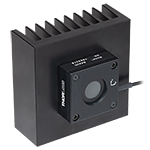
 焦電エネルギーセンサ
焦電エネルギーセンサ